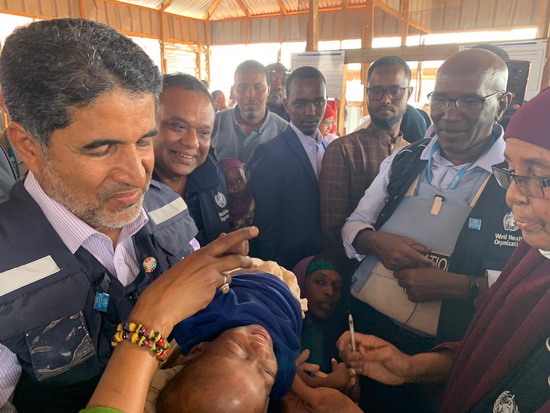
24 APRIL 2020 | Cairo – Any suspension of immunization services or hesitancy to use them during the COVID-19 pandemic will result in a resurgence of diseases that have largely been controlled thanks to safe and effective vaccines. That is the warning from WHO's Regional Office for the Eastern Mediterranean as World Immunization Week (24–30 April 2020) begins.
Immunization is one of the most effective public health interventions. Its role in preventing and controlling deadly diseases has been well demonstrated. Smallpox eradication, the remarkable progress towards polio eradication and the wide control of other vaccine-preventable diseases, such as measles and diphtheria, are success stories that have saved millions of lives and prevented disability on a huge scale.
“In addition to its positive impact on the health of every child who receives the vaccine, high vaccination coverage also protects the wider community,” explained Dr Yvan Hutin, Director of the Department of Communicable Disease Control at the WHO Regional Office. “Expanding access to immunization is vital to achieve the Sustainable Development Goals and WHO’s global goals, the triple billions. As a basic element of primary health care in many countries, immunization significantly contributes to progress towards universal health coverage, in line with WHO’s regional vision of Health For All, By All.”
The Eastern Mediterranean Region has seen a remarkable increase in the number of people receiving vaccines in recent years, with more vaccines introduced and more countries eliminating diseases through immunization. In 2018, 82% of children under one year of age were vaccinated with 3 doses of diphtheria, tetanus and pertussis (DTP3) and one dose of measles vaccine. Measles and rubella elimination has been achieved in 3 countries, and more countries are close to reaching this goal.
Yet around 3 million infants – almost 1 in 5 – still missed receiving their basic vaccines. Measles outbreaks affect several countries and poliomyelitis is remains endemic in 2 countries. Disruption of immunization services, even for brief periods, leaves a protection gap in the population and could result in outbreaks of diseases that were under control such as measles and polio. “With safe and potent vaccines available, no child should die or fall sick from diseases that can be prevented by those vaccines,” said Dr Rana Hajjeh, WHO’s Director of Programme Management in the Region. “While the whole world is looking forward to having a vaccine against COVID-19, maintaining essential immunization services and ensuring strong immunization systems are essential to ensure the adequate delivery of all vaccines – including a COVID-19 vaccine when it becomes available”.
Some countries have suspended preventive vaccination campaigns during the current COVID-19 pandemic, to avoid excessive gatherings of people. However, other methods to deliver vaccines should and must be used. Several countries in the Eastern Mediterranean Region continue to offer routine vaccination services, especially in areas with low COVID-19 transmission, and some of them are using the opportunity of World Immunization Week to offer more opportunities for vaccination.
“Immunization is one of the essential health services that should be maintained and prioritized during the COVID-19 pandemic,” said Dr Ahmed Al-Mandhari, WHO Regional Director. “All efforts should be made to ensure the continuity and adequate utilization of immunization services during the pandemic while also ensuring adequate protection of health care workers and the community.” If immunization coverage decreases due to COVID-19, we will need to understand who has missed their vaccines to make sure that we catch up as soon as possible.
The Eastern Mediterranean Region includes half of all the people affected by humanitarian emergencies globally, and the COVID-19 pandemic threatens to intensify their suffering. Any suspension or underutilization of immunization services will definitely exacerbate the situation. World Immunization Week 2020 is a call to communities, families and individuals to demand and utilize immunization as their right and responsibility, and a call to all governments and stakeholders to ensure the continuity of immunization programmes during the ongoing COVID-19 pandemic.
Related links



